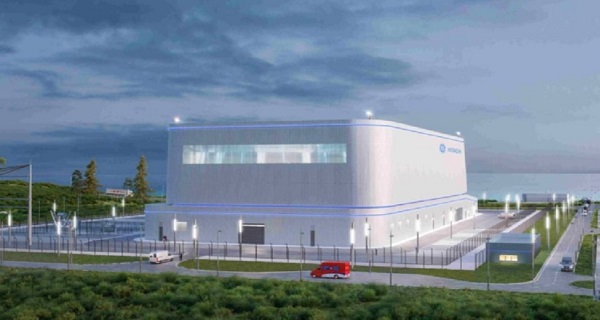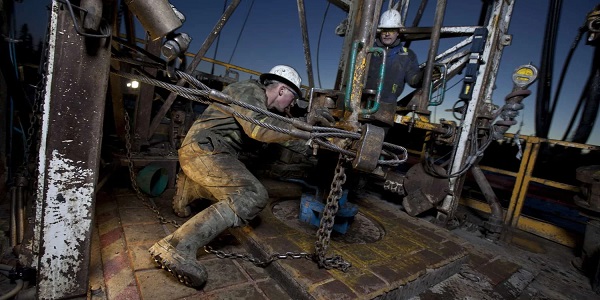Energy
Canada to build it’s first four small modular nuclear reactors

 MxM News
MxM News
Quick Hit:
Ontario has approved plans to build Canada’s first small modular nuclear reactors, positioning the province as a leader in next-generation nuclear energy. The Darlington project is expected to be the first SMR deployment among G7 countries.
Key Details:
- Ontario Power Generation received approval to construct the first of four planned small modular reactors (SMRs) at its Darlington site.
- Each reactor will cost billions, with construction led in partnership with GE Hitachi Nuclear Energy using the BWRX-300 design.
- The project marks the first SMR deployment in the developed world, as interest grows in nuclear as a clean, stable energy source.
Putting Ontario on the map as a leading clean energy superpower.
Starting today, our government is officially saying YES to build the G7’s first Small Modular Reactor, right here in Ontario. Literally leading the world.
🇨🇦 18,000 Canadian jobs
🇨🇦 80% of project from Ontario biz… pic.twitter.com/EFkAEDSkVe— Stephen Lecce (@Sflecce) May 8, 2025
Diving Deeper:
Ontario’s provincial government has officially approved plans for a bold new phase in Canada’s energy strategy: the construction of four small modular nuclear reactors (SMRs) — the first of their kind in the country. Ontario Power Generation (OPG) confirmed Thursday it has received the green light to begin work on the initial reactor at its Darlington New Nuclear Project site.
The reactors represent a significant bet on a new generation of nuclear technology aimed at producing reliable, zero-emissions energy more efficiently and at smaller scale. Unlike traditional nuclear plants that take decades and tens of billions of dollars to complete, SMRs are designed to be built in factories and shipped to installation sites — a method supporters claim will be faster and more cost-effective over time.
The Darlington SMR will utilize the BWRX-300 model, developed by GE Hitachi Nuclear Energy, which delivers 300 megawatts of power — about one-third the output of traditional nuclear reactors. OPG signed an agreement with GE Hitachi in 2023 to deploy the technology at the Darlington site.
Last month, Canada’s nuclear regulator issued a construction license for the project, clearing a key hurdle. Now, with provincial support secured, the Darlington SMR is on track to become the first of its kind to go live in a G7 country — a milestone for both Canada’s energy ambitions and the broader international nuclear industry.
Only a handful of SMRs have been built to date, all in China and Russia.
Daily Caller
John Kerry Lurches Back Onto Global Stage For One Final Gasp


From the Daily Caller News Foundation
John Kerry, one of the grandest and most persistent climate scolds of the 21stcentury, lurched back into the news this week when he was knighted by Britain’s King Charles, a prominent climate scold in his own right.
In fact, their shared efforts involving flying off on carbon-spewing private jets to lecture the masses to live smaller, more costly lives in the name of fighting climate change was the motivation for the award, as the King thanked Kerry for his “services to tackling climate change.” That seems to be a bit of a grammatical error, but when royalty is involved, no one really cares, do they?
“King Charles and I share the same point of view — that there’s an urgency to doing things,” Kerry told the Globe in an interview. “He’s been ahead of most folks on this from the time I can remember… He always had a commitment to nature.”
Unfortunately for the U.K.’s citizens, the Labour government’s “commitment to nature” mainly appears to involve covering thousands of acres of bucolic British farmland with massive solar arrays and felling thousands of forest trees to make home to big wind installations these days.
Projects like those – frequently forced by the central government on objecting rural communities – form the centerpiece of Secretary of State for Energy Security and Net Zero Ed Miliband’s program to deindustrialize the formerly formidable British economy.
That program – based on the shared philosophy of King Charles and Kerry – has sent the U.K.’s utility rates skyrocketing to the highest on earth. It has also rendered the former global power dependent on imports from foreign nations for its energy security, with China the most prominent among them.
Such are the fruits of the King Charles/Kerry “point of view.” Most would agree with Kerry’s statement that “there’s an urgency to doing things.” The problem is that pretty much everything he and the King have been doing in this realm across the first quarter of the 21st century leads inevitably to serfdom to the Chinese Communist Party.
In an interview with the Financial Times the same day, Kerry repeated much of the tiresome dogma of his alarmist religion, in the process excoriating President Donald Trump as a “denier” and calling U.S. corporate leaders cowards for straying from the narrative he and the King prefer. “It is not that they don’t believe [in climate change] or they don’t want to move forward. They are just scared,” Kerry said of the corporate CEOs, adding, “The process of Donald Trump in the last months, coupled with the justice department, coupled with his vengeance programs, has scared… a lot of people.”
But a more believable alternative explanation for the shift away from the twin manias of ESG and DEI by many companies in recent years is that these corporate leaders have a fiduciary duty to maximize returns on capital to their investors. The problem for Kerry and his disciples is that the preferred alternatives they have advanced too often devolved into unprofitable boondoggles that fail to satisfy that duty. Kerry wants to place the entire blame on Trump – who, ironically, was recently honored by King Charles himself with an unprecedented second state dinner. But the truth is that shift started in earnest in 2023, when Joe Biden’s autopen was still in charge of the ship of American state.
That shift has certainly accelerated this year, as companies have been freed from the incessant hectoring of the Biden government and are now being denied access to the ruinous green subsidies from the IRA that so radically distorted energy markets. This has little to do with climate denialism or cowardice and much to do with sound business practice and CEOs properly carrying out the mandates of their high positions. No amount of hyperbolic talking points from Kerry or the King can change that reality.
In the end, Kerry’s remarks come off as a lot of sound and fury signifying nothing. Now in the twilight of his career, he has become a relic, a totem of a fading global religion whose end cannot come soon enough.
David Blackmon is an energy writer and consultant based in Texas. He spent 40 years in the oil and gas business, where he specialized in public policy and communications.
Alberta
IEA peak-oil reversal gives Alberta long-term leverage

This article supplied by Troy Media.
The peak-oil narrative has collapsed, and the IEA’s U-turn marks a major strategic win for Alberta
After years of confidently predicting that global oil demand was on the verge of collapsing, the International Energy Agency (IEA) has now reversed course—a stunning retreat that shatters the peak-oil narrative and rewrites the outlook for oil-producing regions such as Alberta.
For years, analysts warned that an oil glut was coming. Suddenly, the tide has turned. The Paris-based IEA, the world’s most influential energy forecasting body, is stepping back from its long-held view that peak oil demand is just around the corner.
The IEA reversal is a strategic boost for Alberta and a political complication for Ottawa, which now has to reconcile its climate commitments with a global outlook that no longer supports a rapid decline in fossil fuel use or the doomsday narrative Ottawa has relied on to advance its climate agenda.
Alberta’s economy remains tied to long-term global demand for reliable, conventional energy. The province produces roughly 80 per cent of Canada’s oil and depends on resource revenues to fund a significant share of its provincial budget. The sector also plays a central role in the national economy, supporting hundreds of thousands of jobs and contributing close to 10 per cent of Canada’s GDP when related industries are included.
That reality stands in sharp contrast to Ottawa. Prime Minister Mark Carney has long championed net-zero timelines, ESG frameworks and tighter climate policy, and has repeatedly signalled that expanding long-term oil production is not part of his economic vision. The new IEA outlook bolsters Alberta’s position far more than it aligns with his government’s preferred direction.
Globally, the shift is even clearer. The IEA’s latest World Energy Outlook, released on Nov. 12, makes the reversal unmistakable. Under existing policies and regulations, global demand for oil and natural gas will continue to rise well past this decade and could keep climbing until 2050. Demand reaches 105 million barrels per day in 2035 and 113 million barrels per day in 2050, up from 100 million barrels per day last year, a direct contradiction of years of claims that the world was on the cusp of phasing out fossil fuels.
A key factor is the slowing pace of electric vehicle adoption, driven by weakening policy support outside China and Europe. The IEA now expects the share of electric vehicles in global car sales to plateau after 2035. In many countries, subsidies are being reduced, purchase incentives are ending and charging-infrastructure goals are slipping. Without coercive policy intervention, electric vehicle adoption will not accelerate fast enough to meaningfully cut oil demand.
The IEA’s own outlook now shows it wasn’t merely off in its forecasts; it repeatedly projected that oil demand was in rapid decline, despite evidence to the contrary. Just last year, IEA executive director Fatih Birol told the Financial Times that we were witnessing “the beginning of the end of the fossil fuel era.” The new outlook directly contradicts that claim.
The political landscape also matters. U.S. President Donald Trump’s return to the White House shifted global expectations. The United States withdrew from the Paris Agreement, reversed Biden-era climate measures and embraced an expansion of domestic oil and gas production. As the world’s largest economy and the IEA’s largest contributor, the U.S. carries significant weight, and other countries, including Canada and the United Kingdom, have taken steps to shore up energy security by keeping existing fossil-fuel capacity online while navigating their longer-term transition plans.
The IEA also warns that the world is likely to miss its goal of limiting temperature increases to 1.5 °C over pre-industrial levels. During the Biden years, the IAE maintained that reaching net-zero by mid-century required ending investment in new oil, gas and coal projects. That stance has now faded. Its updated position concedes that demand will not fall quickly enough to meet those targets.
Investment banks are also adjusting. A Bloomberg report citing Goldman Sachs analysts projects global oil demand could rise to 113 million barrels per day by 2040, compared with 103.5 million barrels per day in 2024, Irina Slav wrote for Oilprice.com. Goldman cites slow progress on net-zero policies, infrastructure challenges for wind and solar and weaker electric vehicle adoption.
“We do not assume major breakthroughs in low-carbon technology,” Sachs’ analysts wrote. “Even for peaking road oil demand, we expect a long plateau after 2030.” That implies a stable, not shrinking, market for oil.
OPEC, long insisting that peak demand is nowhere in sight, feels vindicated. “We hope … we have passed the peak in the misguided notion of ‘peak oil’,” the organization said last Wednesday after the outlook’s release.
Oil is set to remain at the centre of global energy demand for years to come, and for Alberta, Canada’s energy capital, the IEA’s course correction offers renewed certainty in a world that had been prematurely writing off its future.
Toronto-based Rashid Husain Syed is a highly regarded analyst specializing in energy and politics, particularly in the Middle East. In addition to his contributions to local and international newspapers, Rashid frequently lends his expertise as a speaker at global conferences. Organizations such as the Department of Energy in Washington and the International Energy Agency in Paris have sought his insights on global energy matters.
Troy Media empowers Canadian community news outlets by providing independent, insightful analysis and commentary. Our mission is to support local media in helping Canadians stay informed and engaged by delivering reliable content that strengthens community connections and deepens understanding across the country.
-

 Alberta2 days ago
Alberta2 days agoFrom Underdog to Top Broodmare
-

 Business2 days ago
Business2 days agoMan overboard as HMCS Carney lists to the right
-

 Business2 days ago
Business2 days agoHigher carbon taxes in pipeline MOU are a bad deal for taxpayers
-

 Alberta2 days ago
Alberta2 days agoREAD IT HERE – Canada-Alberta Memorandum of Understanding – From the Prime Minister’s Office
-

 Alberta2 days ago
Alberta2 days agoIEA peak-oil reversal gives Alberta long-term leverage
-

 Bruce Dowbiggin2 days ago
Bruce Dowbiggin2 days agoHealthcare And Pipelines Are The Front Lines of Canada’s Struggle To Stay United
-

 Alberta1 day ago
Alberta1 day agoAlberta can’t fix its deficits with oil money: Lennie Kaplan
-

 Daily Caller2 days ago
Daily Caller2 days agoZelenskyy Under Siege As Top Aide Resigns After Home Raided In Major Corruption Scandal









